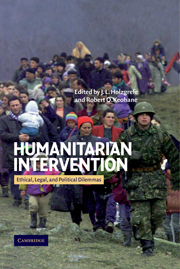Book contents
- Frontmatter
- Contents
- List of contributions
- Acknowledgments
- Introduction
- PART I The context for humanitarian intervention
- PART II The ethics of humanitarian intervention
- PART III Law and humanitarian intervention
- 5 Changing the rules about rules? Unilateral humanitarian intervention and the future of international law
- 6 Interpretation and change in the law of humanitarian intervention
- 7 Rethinking humanitarian intervention: the case for incremental change
- PART IV The politics of humanitarian intervention
- Select English language bibliography
- Index
5 - Changing the rules about rules? Unilateral humanitarian intervention and the future of international law
Published online by Cambridge University Press: 27 July 2009
- Frontmatter
- Contents
- List of contributions
- Acknowledgments
- Introduction
- PART I The context for humanitarian intervention
- PART II The ethics of humanitarian intervention
- PART III Law and humanitarian intervention
- 5 Changing the rules about rules? Unilateral humanitarian intervention and the future of international law
- 6 Interpretation and change in the law of humanitarian intervention
- 7 Rethinking humanitarian intervention: the case for incremental change
- PART IV The politics of humanitarian intervention
- Select English language bibliography
- Index
Summary
In the course of NATO's 1999 air campaign in Kosovo, most international lawyers remained conspicuously silent on the strict legality of the intervention. Of those who gave on-the-record comments, many couched their opinions in terms of “traditional international law,” observing that it provided no clear basis for the intervention but usually refraining from condemning the intervention as illegal. Subsequent legal analysis has seen less ambiguity – and greater divergence of opinion. Authors with more or less similar understandings of the factual situation in Kosovo in the early months of 1999 – widespread and escalating persecution of the non-Serb population by a government and army with a history of mass atrocities elsewhere – arrive at sometimes starkly different conclusions, both on the law as it stood at the outset of the intervention, and on the potential for legal change.
Normally, when academic lawyers come to starkly different conclusions, this indicates that the questions of law are difficult ones on which experts reasonably can disagree. On the basis of traditional approaches to the interpretation of treaties and the analysis of customary rules, however, the Kosovo intervention was clearly illegal, and regarded as such by enough states that it could not possibly have contributed to a change in the law. It is therefore tempting to dismiss those who come to any other conclusion as mistaken or opportunistic in their interpretation.
- Type
- Chapter
- Information
- Humanitarian InterventionEthical, Legal and Political Dilemmas, pp. 177 - 203Publisher: Cambridge University PressPrint publication year: 2003
- 26
- Cited by



